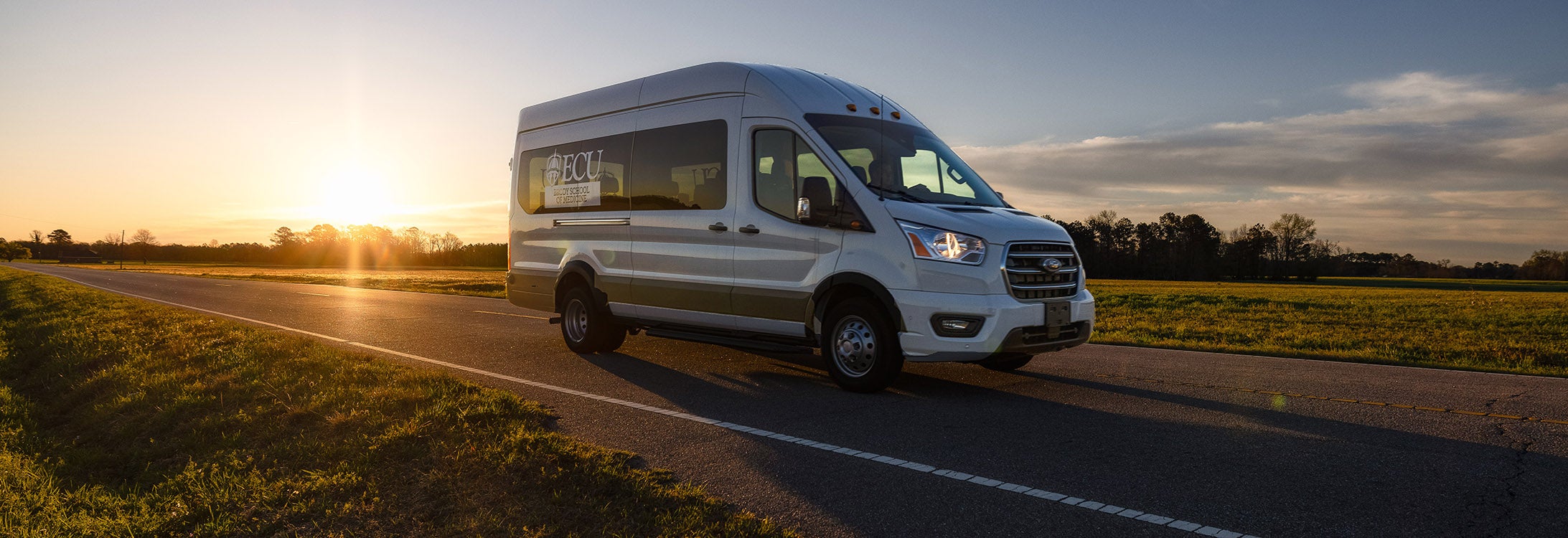DRIVING HEALTH CARE
ECU providers take health screenings, vaccines on the road across the region
Across eastern North Carolina, conversations are cropping up about health and health care—but these discussions aren’t taking place in doctors’ offices.
They are happening outside factories, at automotive garages, on the edges of farm fields, in the parking lots of neighborhood churches and even on the Outer Banks—and they are part of an effort by the Brody School of Medicine at East Carolina University and the ECU Division of Health Sciences to bring health care to people in the East who have more difficulty accessing the care, resources and information they need to live a healthy life.
Brody and division providers are using specially equipped vans to literally drive health care into communities in rural and under-resourced areas of the region. Made possible through CARES Act funding and strong community partnerships, the project paves the way for COVID-19 vaccinations and health screenings to reach people who live and work in rural counties.
The project is led by Dr. Paul Bolin, chair of internal medicine at ECU’s Brody School of Medicine, and Dr. Paul Shackelford, clinical professor of obstetrics and gynecology and research professor for internal medicine at Brody. The two set out initially to address hypertension, diabetes and obesity—three conditions that plague eastern North Carolina and can lead to serious health complications. The team adapted as the pandemic emerged and made plans to administer the vaccine as well.
View this video on YouTube for closed captioning.
So far, the vans and their teams, which include providers and volunteers from all over the ECU Division of Health Sciences and community partners, have been to seven counties, conducted nearly a dozen health screening events and administered more than 1,000 COVID-19 vaccinations.
The project was created using the bare bones of the division’s—and ECU’s—missions.
“It is very apparent that we have a number of populations in eastern North Carolina that suffer from poor access to care,” Bolin said. “The only way we’re going to solve this is to go to them.”
That concept keeps the promise ECU made to improve the quality of life and health for people in the East and beyond. It also became more urgent with the emergence of the pandemic.
“If you take the top five or six causes of mortality in eastern North Carolina,” Bolin said, “they align with the leading risk factors of mortality from COVID-19.”
The roads less traveled
With two vans and a trailer modified as two exam rooms, the teams head out across the East multiple times a week, depending on scheduling. So far, they’ve traveled to the Outer Banks, Pasquotank and Pender counties, Kinston and other rural communities in the region.
Some of the stops have been scheduled by ECU providers; others have been requested by business owners happy to take advantage of the innovative project. At the beginning of the project last fall, the teams provided free flu vaccinations as an incentive for participation, which led to more people receiving those shots as well.
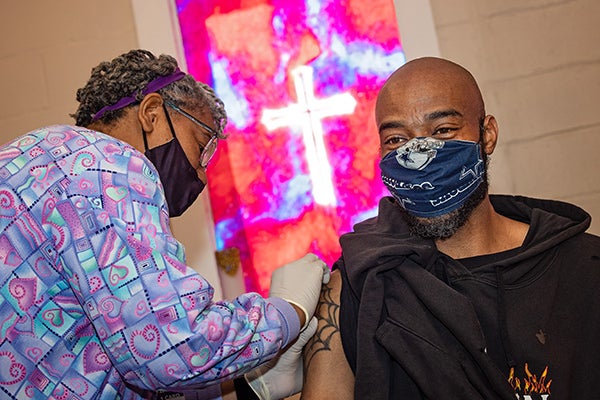
ECU’s Barbara Williamson LPN administers a COVID-19 vaccination to Johnny Tyson during a COVID-19 vaccine event at Rebuild Christian Center Church in Winterville on March 11.
Vaccinations took on a new look after the first of the year when plans for COVID-19 vaccination phases were rolled out.
On a Thursday morning in March, the vans visited Rebuild Christian Center Church in Winterville. Parishioners typically flock to the quaint church – nestled in a residential neighborhood on Jones Street, across from WH Robinson Elementary School – to hear Pastor Darron Carmon preach the gospel.
On this day, however, more than 100 people stopped by the church to be vaccinated. And for those not physically able to walk into the church, ECU staff took the vaccine to their vehicles.
“Some communities are underserved, and this would be one of those communities,” Carmon said. “I appreciate ECU for coming and partnering with us to make this happen, because apparently somebody cares and apparently somebody wants to be part of the solution… so we can save lives.”
Carmon said the ability to partner with ECU to offer vaccinations at the church encouraged more people to get vaccinated who otherwise would not have.
“I think it’s easier to get people here than other places, because churches in our community are beacons of hope and places of inspiration. It’s a place that people trust, that they rely on and that they depend on,” he said. “So it’s different, even for me, to say, ‘Go over there’ than to say, ‘Come over here,’ which makes them feel a lot more comfortable.”
Ronnie Huggins of Winterville wanted to get a COVID-19 vaccine as soon as possible, because he wanted to keep his grandson safe. When he learned ECU’s mobile unit would be in town, he made plans to swing by.
“If you’re around a lot of people, you look at them and wonder, ‘Have they been vaccinated? Are they vaccinated?’” Huggins said. “I just want to be safe.”
Lina Martelo of Ayden wanted to take advantage of the convenience of the traveling team and received her COVID-19 shot as well. She expressed appreciation for the opportunity and for the efforts to keep entire communities healthy.
“I think it’s amazing,” she said. “It’s good that ECU is really trying to get into the community and help people and tell people about the vaccine. It means a lot because they’re making the community healthy.”
To gear up for a typical day when the vans provide both health screenings and the vaccine, providers prepare the night before, getting machines and tools packed and ready to go at dawn—or earlier. At the scheduled destination, the machines are allowed to warm up before screenings begin. Each person then spends about 10-15 minutes with a health care provide, depending on their needs and follow-up recommendations.
The visits have been rewarding for patients and providers alike.
At one mechanic shop, employees between the ages of 20 and 60 engaged in competitive banter over whose bloodwork results were the best. At another workplace, a woman who had never been to a doctor was connected with information about primary care providers. Another who had been living with undiagnosed diabetes was set up with resources and information for follow-up.
When the project began in the fall, providers used their own vehicles to travel eastern North Carolina and conduct screenings.
Last summer, Shackelford and Bolin discussed how they would switch gears with the project to not only screen for risk factors of disease, but also provide vaccines. The funding for COVID-19 projects helped cover the cost of the mobile units, which arrived after the first of the year.
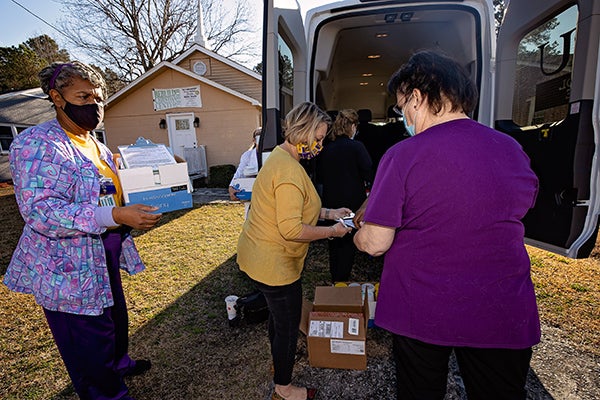
ECU representatives arrive at Rebuild Christian Center Church in Winterville for a COVID-19 vaccine event on March 11.
“We began some dialogue in the early summer about needing some additional horsepower to address this COVID response,” Shackelford said. “There are doctors who are already taking care of folks in the clinic and taking care of folks in the hospital and doing an outstanding job, but one of the things we wanted to start looking at was how we protect the community.”
While the initial amount of vaccinations was low, the doctors were not discouraged because of the populations they were able to serve – residents of nursing homes and group homes who could not pursue the vaccine on their own were vaccinated.
“That population—a very vulnerable group—was helped,” Shackelford said. “We agreed to take on that mission. We know that they need care, and if they were easy to do they’d already be at the mass vaccination sites.”
Other people, he added, don’t have the technology or email accounts needed to make a vaccination appointment online. The project provides another option for those and others who need an unscheduled vaccination or visit.
Winterville Councilman Ricky Hines said the mobile unit’s visit to Rebuild Christian Center Church was a “breath of fresh air” for the town’s residents because it meant that they could get vaccinated in their own community.
“That’s what it’s all about, being accessible. Especially in communities where people are a little hesitant. But if they see that you’re coming into their community… and if they see people that they recognize getting the shots, it kind of makes it easier for them,” Hines said. “For ECU to come out, it just proves that if you go to the people, people will get things done.”
In high gear for better health
Bolin grew up in rural Duplin County, the son of the only primary care physicians for miles in any direction.
He remembers the scenes vividly, watching the family’s living room transform into an emergency room. He learned early on the consequences of living in a region without available health care. He followed in his father’s footsteps—and inherited a profession faced with some of the same stubborn problems that existed in his childhood.
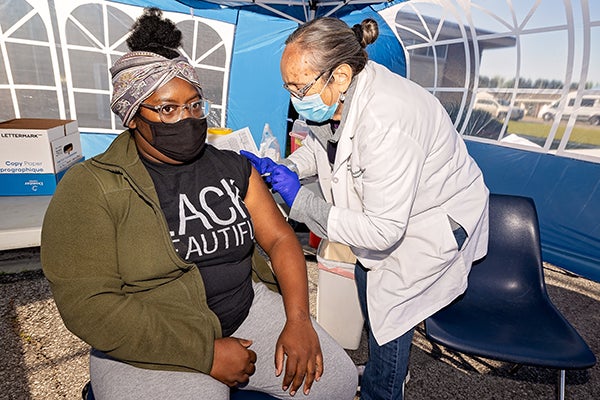
Phyllis Worthington LPN, from the Department of Internal Medicine at ECU’s Brody School of Medicine, administers a COVID-19 vaccine to Makala Jones during an event in a Farmville residential neighborhood on April 22.
“There was poor access to health care in eastern North Carolina then,” Bolin said. “Many of the problems still persist in ways we don’t see. Poor access to health care is a very real issue in eastern North Carolina.”
The participation and response in the wake of the mobile project’s presence in communities is encouraging, he added.
“The reception has been amazing,” Bolin said. “I do think it fills in a gap that has existed for a very long time. This is not a transformation of how we deliver care, but just a population that we have decided to address.”
The idea for the project itself was born not only of necessity but also out of some surprising results on a health care survey Bolin conducted in the East. With nearly 2,000 people surveyed, the overwhelming reason people were not regularly seeing a doctor was “inconvenience.”
The van project addresses that by bringing care to workplaces. There has been nearly a 100% participation rate among that business’s employees.
That number is important also because it signals the project leaders to take information learned during the pandemic and assess the future of health care delivery in the region.
“The work is informing a way to provide services to eastern North Carolina,” Shackelford said, “We’re beginning to see an opportunity to rebuild a system to meet people where they are physically, where they are in time, and where they are spiritually.”
Bolin sees the project as a way providers and volunteers from across ECU’s Division of Health Sciences can honor the university’s mission of service.
“It is our mission,” he said. “To serve is to meet a person where they are. It’s absolutely key. Another part of our mission is to assist in regional development and transformation, and this is very much a part of that.”
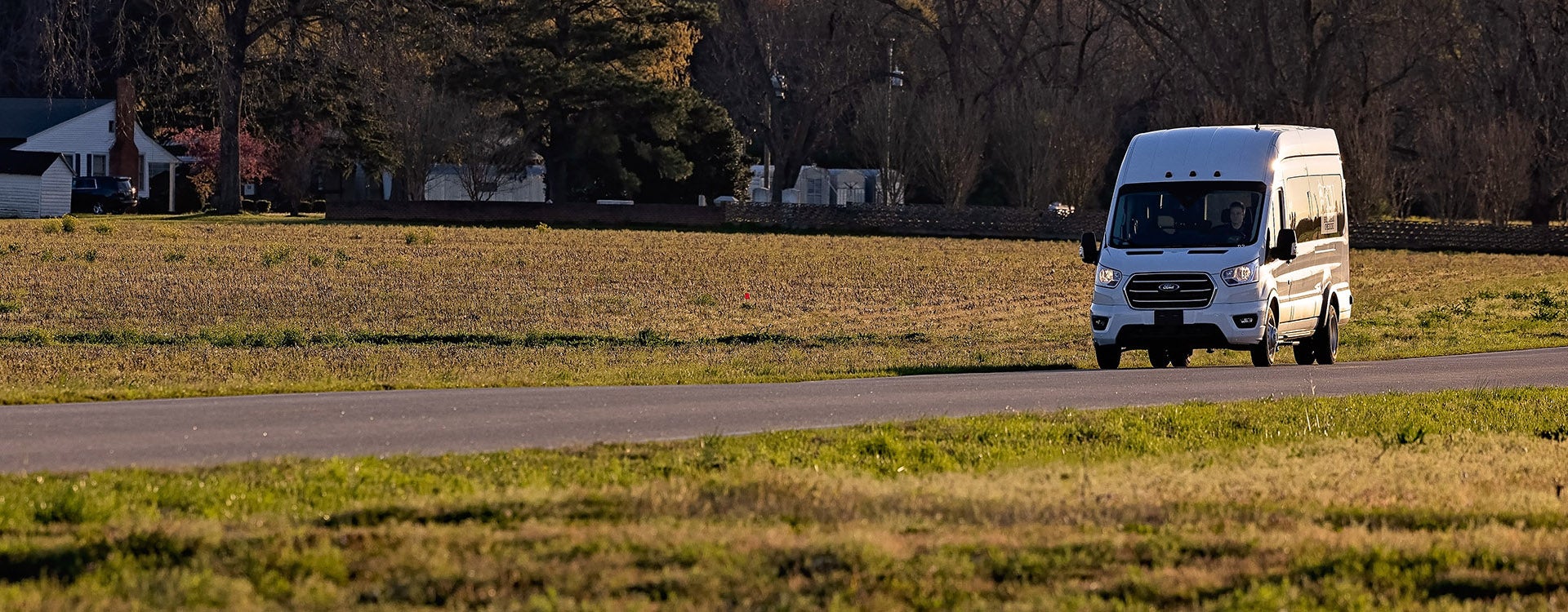
The Brody School of Medicine’s mobile health unit travels through a rural portion of eastern North Carolina.
